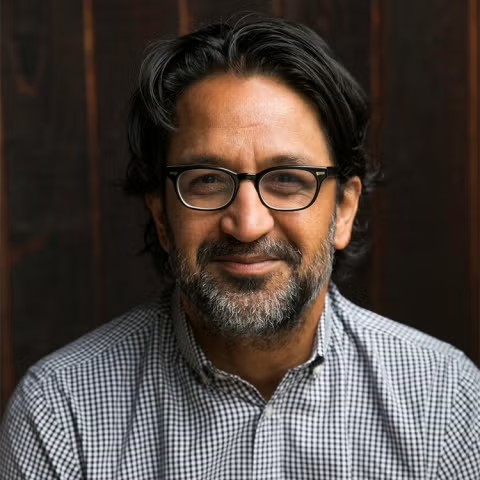
With the start of the Fall 2025 quarter Sameer Pandya has officially begun his tenure as chair of the nation's first Asian American Studies department. It’s a pivotal moment for both the professor and acclaimed novelist and the program, which is why Pandya plans a disciplined schedule that will allow him to carve out time for writing before the administrative day begins. He sees an intrinsic link between his two roles.
"I often think about fiction writing as working on simultaneous canvases at the same time," he remarked, referring to his process of managing different projects, from initial creation to final revision. "I write character," he said. "And character has always been the thing I'm interested in because I am interested in people, I'm interested in what they reveal about themselves when they do not say things, what they reveal about themselves when they do say things."
This same curiosity about people and context informs not only his academic perspective, but his curiosity concerning a literary genre that is arguably closely tied to his work: the campus novel. Traditional models of this genre no longer suffice in the face of modern university tensions, Pandya argues, given the constant flux of the modern academic environment, which has become a highly charged and complex social space.
The campus as a social space is changing constantly, he said. “And the question is, how does a novel keep up with those changes?"
“I am interested in both the relationship between Asian American history and literature, and the relationship between Asian American studies and ethnic studies more broadly,” Pandya explained. “And exploring the ways in which Asian American studies has made important interventions into these larger conversations that universities have had around ethnic studies for the last 30, 40 years.”
It is this challenge of keeping up with change that defines his vision for the Asian American Studies department. Because today's students face different pressures and possess different expectations than previous generations, Pandya is committed to thinking through, alongside his colleagues, the curriculum and mission to remain relevant to a contemporary setting, directly addressing the needs and concerns of his current students, who navigate a distinct set of contemporary racial and ethnic realities.
While the questions facing today’s young scholars might the same as those faced by earlier generations, the answers will be different. “How are students feeling? What do they expect from a degree? What is it they feel they are not getting from a degree?” Pandya wondered. “What I would like to do is find a way for Asian American studies to meet that challenge."